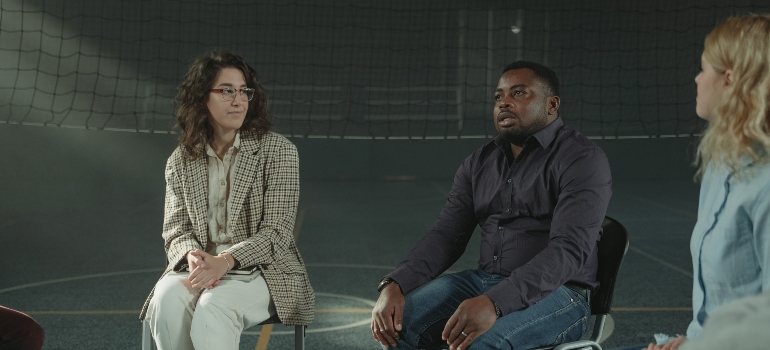Substance use treatment usually incorporates both individual and group therapy, as this is the preferred approach for most people. However, some people might not be comfortable with one or the other, which is why the group vs individual treatment for substance use disorders debate is still ongoing. This is why most addiction treatment centers in West Virginia provide their clients with both options, either together or separately. In this article, we will explain how each treatment type works, the differences and similarities between the two, as well as their benefits and drawbacks. We will also explain who can benefit the most from each therapy type, and how veterans may benefit from each approach.
How does group treatment for substance use disorders work?
Group therapy for substance use disorders works by involving the patient with a group of people in a similar situation. The entire group is led by a mental health professional with experience in addiction treatment. During group therapy for addiction, patients will share their experiences and work through their issues as part of a group. Depending on the people involved, the sessions will have numerous topics to be discussed, and participants will be able to see how other people react to problems that are similar to their own.

In addition, certain therapy types are only possible when in a group setting. Family therapy for addiction, for example, is all but impossible to conduct in an individual setting. Then there are psychoeducational groups that only work when there are multiple people involved. These groups focus on providing their participants with information about substance use disorders, as well as developing necessary skills and coping mechanisms.
Benefits of group therapy
Group therapy for substance use disorders has two primary benefits: Shared experiences and peer support. Furthermore, group therapy is an excellent way of building communities and providing an individual with a sense of belonging. For example, many residential treatment facilities in WV have vibrant communities built solely around their group therapy sessions. These communities help their members avoid feeling isolated, which is something that often accompanies addiction.
More importantly, however, group therapy provides shared experiences to the entire group. Finding out about someone else’s problems can be an extremely helpful thing for your own recovery, for example. Not only that, but different people have different coping mechanisms, some of which you might find extremely useful. Lastly, when you share your story and your experiences, you might find a sense of purpose, as you are helping others overcome their addiction issues.

Another thing that makes group therapy for substance use disorders so effective is the fact that you will get support from your peers. Some people, for example, may have a difficult time leaning on other support mechanisms but will readily accept help from someone in the same position as they are. Lastly, a group therapy setting means that there is less focus on any particular individual, meaning that you might feel less overwhelmed throughout the course of the therapy.
Drawbacks of group therapy
Group therapy is not without its flaws. The first drawback of group therapy is the fact that individual attention is considerably limited. The therapist will not be there solely for you but for the entire group. When it comes to group vs individual treatment for substance use disorders, this can be quite significant. During group therapy sessions, the therapist will try to devote approximately the same amount of time to each individual. As you might imagine, this might be a considerable limitation, as some people may require more attention than others. Someone who is attending stimulants rehab, for example, might require more time working through their issues than someone who is struggling with marijuana addiction. While therapists will always do their best to account for their differences, there is no denying that a group setting lacks individual attention.
The second drawback of group therapy for substance use disorders is the fact that you may encounter negative influences. Learning about someone else’s experiences may benefit your recovery, but it can also hinder it in certain situations. Of course, the therapist will try to minimize these influencing factors but once the “cat is out of the bag”, the damage might have already been done.

Lastly, some people may simply have issues being around several people at the same time. If a person is not comfortable opening up in a group setting, group therapy might not be for them.
How does individual treatment for substance use disorders work?
Individual treatment for substance use disorders is much more personal, as it involves only two people: The patient and the therapist. Aside from those two, there will be no one else in the room. This allows the therapist to fully focus on the individual. Individual treatment is usually a core component of all substance abuse treatment WV programs, with good reasons. Furthermore, some therapy types, such as EMDR (Eye Movement Desensitization and Reprocessing) can only be accomplished in an individual setting.
Similar to group therapy, individual therapy for addiction also has its fair share of benefits and drawbacks. Let’s take a look at some of the most important ones.
Benefits of individual therapy
The most important benefit of individual therapy is the fact that you will receive full and undivided attention from your therapist. This will allow you to laser-focus on your problems and work on one problem at a time. In addition, your therapist will get to know you much better in an individual setting, allowing them to create personalized treatment options. This is the primary reason why most West Virginia heroin rehab centers have extensive individual therapy programs. When it comes to individual attention, there is simply no replacement for individual therapy. In other words, if you were to consider group vs individual treatment for substance use disorders on individual attention, there is no contest.

Aside from getting all of the therapist’s attention, individual therapy also allows for much more focused treatment. This means that getting to the root of your addiction is much more likely to happen through individual therapy. Furthermore, learning the necessary skills and coping mechanisms is much easier in an individual setting. By undergoing individual therapy, you will have access to all types of cognitive behavioral therapies, as well as other techniques such as contingency management and motivational interviewing.
Another benefit of individual therapy is that it is fully confidential. Any and all information you share with your therapist will be completely private. Aside from that, there is a good chance that you will form a strong therapeutic alliance with your therapist, allowing you to maximize your time and overcome your substance use disorder in the most efficient way possible.
Due to all these benefits, it is no wonder that individual therapy is the most used form of treatment for substance use disorders, by far. That being said, there are still some disadvantages to it.
Drawbacks of individual therapy
The first disadvantage of individual therapy is that there is no peer interaction whatsoever. While most people respond positively to their interactions with a professional therapist, some people simply do not think that the therapist understands them. Most of the time, there will be a significant age difference between the therapist and the patient, even in rehab for seniors. This can be a significant limiting factor to the therapy’s effectiveness. Furthermore, individual therapy may struggle with making the patient motivated enough to commit to a significant change.

Another factor that, unfortunately, drives many people from individual therapy is that it is more expensive than group therapy. While both group and individual therapy are covered by insurance, the difference in out-of-pocket costs can be quite significant.
Lastly, individual therapy does nothing to help with any feelings of isolation. It is rather easy to forget that there are others that are in a similar situation as your own when you are not actually interacting with them. Furthermore, it is much more difficult for the therapist to gain insight into how their patients react to group interactions if they have never observed them in that setting.
Group vs Individual Treatment for Substance Use Disorders – Differences and Similarities
Before we get into the differences and similarities between group vs individual treatment for substance use disorders, it is important to understand that these therapies are not mutually exclusive. In fact, combining the two can usually lead to the best results.
Both group and individual therapy share similar forms of treatment. While some treatment types may be performed in either group or individual settings, most work in both. The most common therapy type, CBT (Cognitive Behavioral Therapy) works great in both individual and group settings, for example. Furthermore, both therapy types will provide the patients with the opportunity to learn more about their addiction and develop the necessary skills and coping mechanisms. As for the functional difference between individual and group therapy, the common consensus is that they are equally effective. Therefore, if you have to choose one over the other, it will usually be up to your preferences and your particular case.

The largest difference between group and individual therapy is that one allows for peer support and interaction while the other focuses solely on the individual. Individual therapy will allow you to explore your experiences in depth, while group therapy will allow you to share those experiences with others and benefit from their experiences.
Who can benefit from each therapy type?
Figuring out which therapy type is best for you usually comes down to personal preference and personal needs. If you are someone who is not comfortable talking in a group of people, chances are that you will benefit more from individual therapy. On the other side, if you are someone who has trouble believing professional therapists, or someone that takes their “cues” from others, group therapy might be ideal. Of course, there’s also the cost factor, which may influence your decision as well.
Basically, before choosing the best therapy type, you will want to consider the following individual factors:
- Your personal preferences
- Cost of the therapy
- Whether you have the desire to improve interpersonal relationships
- How much peer support do you require
- Your personal needs
- Whether you have a need for accountability
The best way to go about selecting the right therapy type is to talk to a substance use disorder specialist first. They will help you determine your preferences and may help you make a decision. The fact of the matter is that, sometimes, you may not even know what is best for you. This is especially true if you are just starting to recover from a severe substance use disorder.
Group vs individual treatment for substance use disorders for veterans
The fact of the matter is that veterans who are struggling with a substance use disorder are somewhat of a special case, as most of them have to deal with PTSD as well. When it comes to choosing the best therapy type, many veterans prefer individual therapy. That being said, group therapy for veterans suffering from substance use disorder is quite common as well.

There is some research that indicates that veterans may benefit from group therapy more than individual therapy, most veterans choose to start with individual therapy at first. According to one APA study, most veterans stated that they have significant concerns about expressing emotions in a group, as well as not wanting to be misunderstood. Furthermore, group composition seems to be much more important to veterans, as many have stated that this is the primary reason for dropping out of group therapy sessions.
However, there is also a large difference between the Vietnam-era veterans and the younger ones when it comes to therapy preference, as younger veterans are much more amenable to a group therapy setting. Overall, there are no conclusive findings as to which therapy type is more suitable for veterans, as both group and individual therapy have similar results. The only thing that is different is the veteran’s outlook on substance use disorder therapy. Since this is highly individual, it is all but impossible to recommend group vs individual treatment for substance use disorders for veterans. The best course of action is to try both and see which one works better.
When it comes to group vs individual treatment for substance use disorders, both have their place in recovering from addiction. The choice between the two usually comes down to personal preference and personal goals.



